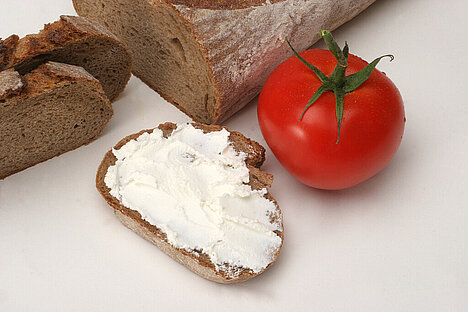Cream cheese

What is cream cheese?
Cream cheese is a type of fresh cheese made from acidified milk or cream. It has a high water content of over 73 percent and a fat content of at least 18 percent. It is not matured, but eaten immediately after production. It therefore has a very short shelf life and must be stored in a cool place.
Cream cheese is high in protein, calcium, magnesium and vitamins. It can be eaten on its own or refined with herbs and spices. It is suitable as a spread, sauce or dip or for baking cakes.
Benefits of cream cheese for dogs
Cream cheese can have a number of benefits for dogs if fed in moderation. For example:
- It can be used as a treat or reward, for example when training or giving medication.
- It can aid digestion as it contains lactic acid bacteria that can support the intestinal flora.
- It can strengthen bones as it provides calcium, which is important for bone formation.
- It can make the coat shiny as it contains fat, which is important for skin and coat health.
Disadvantages of cream cheese for dogs
Cream cheese can also have some disadvantages for dogs if fed too often or too much. For example:
- It can lead to obesity as it contains a lot of calories. One teaspoon of cream cheese has about 34 calories, which can be a lot for a small dog.
- It can cause diarrhea because it contains lactose, which some dogs cannot tolerate well. Lactose is the milk sugar contained in dairy products.
- It can lead to allergies as it contains milk protein, which some dogs cannot tolerate well. Milk protein is one of the most common allergens in dogs.
- It can cause stomach ache as it is very fatty. Fatty foods can stress the pancreas and lead to inflammation.
What you should look out for if you want to feed your dog cream cheese
If you want to feed your dog cream cheese from time to time, there are a few things you should bear in mind:
- Only feed small amounts and not every day. One teaspoon per day is sufficient for a small dog, one tablespoon for a large dog.
- Only feed natural cream cheese without additives such as salt, sugar or flavorings. These can be harmful to your dog.
- Observe your dog after feeding for possible signs of intolerance or allergy such as diarrhea, vomiting or itching. If you notice any of these, you should stop giving your dog cream cheese and consult a vet.
- Pay attention to the best-before date and refrigeration of the cream cheese. Do not use expired or spoiled cream cheese, as this can harm your dog.
Cream cheese is a tasty dairy product that can be suitable for dogs in small amounts and as an occasional treat. It can have some health benefits, but also some risks. You should therefore only feed your dog natural cream cheese in moderation and make sure it is well tolerated.
If you notice any signs of hypersensitivity or poisoning in your dog, you should see your vet immediately. We are not a substitute for a vet, but we try to be as accurate as possible. Every dog reacts differently and we recommend you get a second opinion or consult your vet if in doubt.
Stay healthy and take good care of your four-legged friend!😊